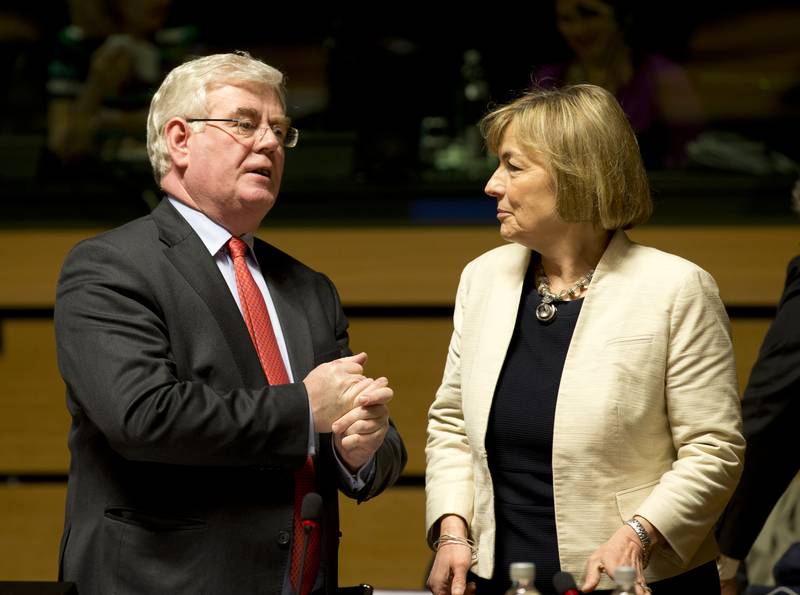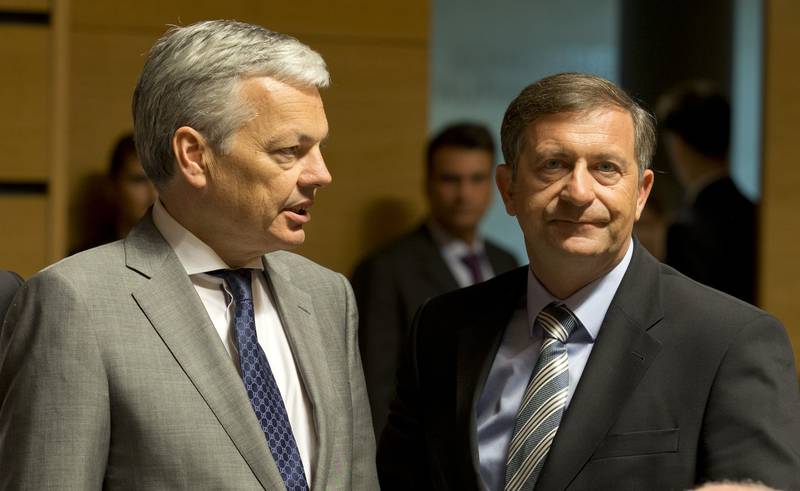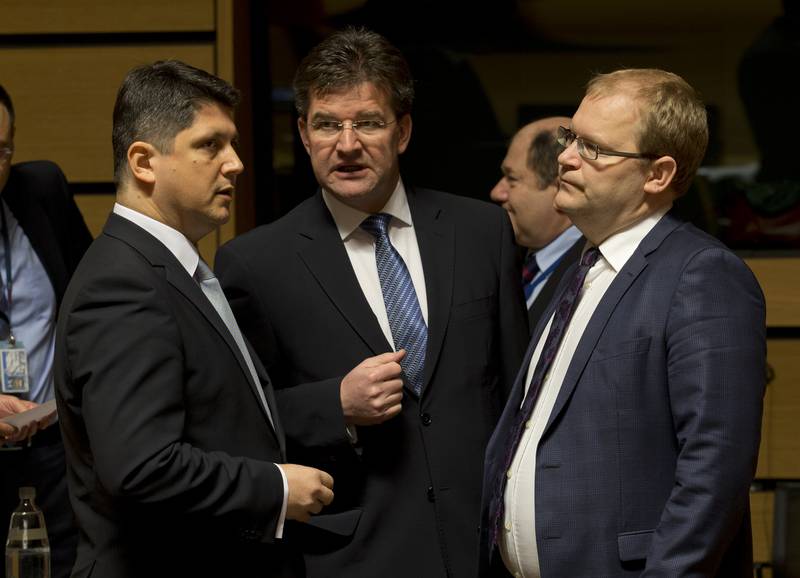Who Can Restart Bosnia and Herzegovina?
Adelina Marini, April 29, 2014
Bosnia has not been forgotten by the EU, not even at a time when the Union is strongly engaged with Ukraine, but does Sarajevo remember what commitments it made to the EU? This is one way to summarise the first Foreign Affairs Council of the EU which adopted special conclusions on Bosnia and Herzegovina after the initiative of several member states among which Croatia, which tabled a rather innovative proposal. Alas, many member states decided that Zagreb's idea Bosnia to receive a status of a special candidate state is too eccentric at this stage and that is why the foreign ministers united around much more moderate or rather realistic conclusions. In them, it is again reiterated that the EU remains fully committed to Bosnia and Herzegovina's European path, but that this is not a one way process. Much more is needed on behalf of the Bosnian authorities.
The Council insists the existing conditions for beginning of BiH's eurointegration process to be fulfilled and only then to move toward the next phase. What is new in the conclusions is that they recognise the problems that had led to the mass demonstrations in the country in the beginning of the year and admit that the EU can do more on this issue. The Union also supported a Compact for Growth for the country, the purpose of which is to help the country's institutions to identify specific social-economic structural reforms that could help boost the economy and jobs creation. Results are expected in the mid-term. Besides, the Council has backed the European Commission's idea to expand the current high level dialogue on justice to include more generally the rule of law and fight against corruption.
With the aim to realise these and the older ideas to inspire Bosnia and Herzegovina, the Council calls for acceleration of the already agreed projects financed by EU money, but recalls that, regretfully, due to internal differences BiH was unable to secure fulfilling of the criteria for pre-accession assistance.
A success or a failure are the foreign ministers' conclusions?
Against the backdrop of the ambitious Croatian idea to immediately begin accession negotiations with Bosnia and Herzegovina by including all the pre-conditions in the negotiations, which will practically restart the process, the agreed on April 14th text by the foreign ministers could sound very disappointing. Most reactions so far show that, in fact, these conclusions are a big achievement. Croatia's first Deputy Prime Minister and Minister of Foreign and European Affairs Vesna Pusic seemed with mixed feeling when she commented the issue for euinside [the attached video]. On the one hand, she is grateful for the efforts of EU's high representative for foreign policy Catherine Ashton and her colleagues because, in her words, after all, the issue of Bosnia and Herzegovina found a place on the agenda. "They agreed, first of all, to discuss BiH which is an issue but certainly by many seen as not as important as, let's say, Ukraine, the Eastern partnership, Syria or the Southern Mediterranean, but I think everybody realised that a country that's an issue in Europe if there is not an appropriate reaction at the right moment could, maybe, become a bigger problem and I was very happy with the fact that absolutely everybody participated in the debate", Ms Pusic explained.
 She said that almost everybody participated in the debate, but some ministers presented written contributions. Those are Austria, Hungary, Slovenia, UK, Italy. This, according to the Croatian foreign minister, is a signal that there is a political will to do something and to keep the topic on the agenda. According to her, what has been achieved is a success, but there is a long way until the Croatian idea is realised. First, the European elections should pass, then the new Commission should be formed and probably by the end of the year it can be seen how the discussion has evolved. Croatia, however, will not stop seeking support, becomes clear from this website's conversation with Vesna Pusic.
She said that almost everybody participated in the debate, but some ministers presented written contributions. Those are Austria, Hungary, Slovenia, UK, Italy. This, according to the Croatian foreign minister, is a signal that there is a political will to do something and to keep the topic on the agenda. According to her, what has been achieved is a success, but there is a long way until the Croatian idea is realised. First, the European elections should pass, then the new Commission should be formed and probably by the end of the year it can be seen how the discussion has evolved. Croatia, however, will not stop seeking support, becomes clear from this website's conversation with Vesna Pusic.
The Croatian proposals hide risks
Bulgaria entirely supports the Council conclusions from April 14th because it believes that now the ball is in the playground of the political leaders in Bosnia and Herzegovina. In its answers to euinside, the Bulgarian Ministry of Foreign Affairs points out that the processes needs to be initiated from the inside not from the outside, although the EU is ready to help. The country's political leaders are those who have to invest efforts to handle the problems and to fulfil the conditions for progress in the process of European and Euro-Atlantic integration. Sofia believes that the Croatian proposal represents, practically, a deviation from the adopted methodology of the enlargement process. This could lead to a revision of the pre-conditions for BiH which is applying the European Court for Human Rights ruling on the Sejdic-Finci case. "Turning the Western Balkans into a specific country-by-country case could lead to a deadlock in the enlargement as a process by complicating it and creating separate rules for each country", read the answers of the foreign ministry sent via e-mail.
Bulgaria also believes that a revision of the Dayton peace accord looms up more and more as a key issue from the perspective of ensuring the normal functioning of Bosnia and Herzegovina as a state. This debate, however, is not very wise to take place before the elections in October. Sofia is worried also that the elections might not lead to a quick formation of a new government that will be able to make clear commitments and to launch the necessary reforms.
Slovakia has a similar position. In the answers to euinside of the Slovak foreign ministry it is pointed out that, unlike BiH, other countries in the region had prepared their own visions and have undertaken decisive measures to reform and modernise their countries and to improve the lives of their citizens. The logic behind the agreed conclusions on April 14th is that the EU not only continues to support and help BiH but it is also ready to expand its agenda and commitments to the country. "But there will be no progress at all without political will, credible efforts and results shown by BiH institutions and leadership. We simply cannot make homework for local leaders. A visionary politician, or visionary leadership should be able to transform shortcomings into advantages and the EU is here to support the  process", read the answers of the Slovak foreign ministry which are completely in harmony with previous positions stated by Minister Miroslav Lajcak on the issue.
process", read the answers of the Slovak foreign ministry which are completely in harmony with previous positions stated by Minister Miroslav Lajcak on the issue.
One of the countries with an idea of its own for breaking the deadlock in BiH is Slovenia. The country's Foreign Minister Karl Erjavec believes that it is better to apply on the country the formula that Catherine Ashton invented for Serbia and Kosovo. In his letter from February 14th to the EU high representative for foreign affairs, Mr Erjavec points out that the Union must realise that constantly imposing conditions does not work and much more serious commitment is needed. According to him, the pro-active approach in the Belgrade-Pristina dialogue is very appropriate. Moreover, Ljubljana, just like Bulgaria, is of the opinion that the time has come for a revision of the Dayton peace accord. "We are all aware that the Dayton Agreement put an end to the war, but it did not provide for a functional country. This is why I believe that the EU needs to set in motion and lead an appropriate process with the support of its international partners. The process should be well prepared, timely and, most importantly, well-delivered".
Slovenia is generally satisfied with the foreign ministers' conclusions because, according to the Slovene foreign ministry, many of Ljubljana's proposals have been taken into account. Slovenia is among the countries that are concerned that the Croatian proposals could be perceived as lowering the bar something which Ms Pusic firmly denies. "There is a substantial homework that needs to be done on the side of Bosnia and Herzegovina", is said in the Slovene foreign ministry's answers and it is pointed  out explicitly that it is a bit overrated to call a restart of the eurointegration process in BiH what is proposed in the Slovene letter.
out explicitly that it is a bit overrated to call a restart of the eurointegration process in BiH what is proposed in the Slovene letter.
Too many knowns
At this stage, it is evident that the EU, indeed, is committed to Bosnia and Herzegovina, but it is not clear if all member states share the view that the Dayton peace accord is exhausted and needs to be revised. Against the backdrop of the unabating crisis in Ukraine and the possibility it to continue to be a source of serious political problems for the EU in the coming years, it is hardly realistic to expect the launch of a process of revision of BiH's construction any time soon. To what extent is this imperative will be seen in the end of the year when the results from the October elections in the country emerge and when the new Commission shares its views about the enlargement process. It is very important to also see what will be the structure of the future European Parliament and whether the eurosceptic parties that are not very positively tuned to enlargement will have a significant influence in it. All this against the backdrop of increasing analyses that the developments in Ukraine strongly remind of the developments in former Yugoslavia in the beginning of the 1990s.
 Bakir Izetbegovic, Andrej Plenkovic | © Council of the EU
Bakir Izetbegovic, Andrej Plenkovic | © Council of the EU Aleksandar Vucic, Recep Tayyip Erdogan | © Serbian Presidency
Aleksandar Vucic, Recep Tayyip Erdogan | © Serbian Presidency Jean-Claude Juncker, Zoran Zaev | © European Commission
Jean-Claude Juncker, Zoran Zaev | © European Commission